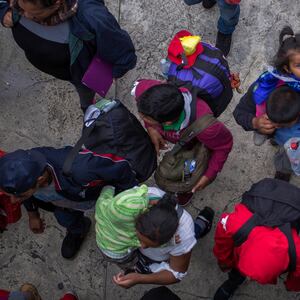CIUDAD JUAREZ, Mexico — The last time Freddy tried to enter the United States, he spent seven days in a semi-truck trailer with 180 other migrants, struggling for oxygen. Some lost consciousness. Some may have died.
“I don’t know if they all made it,” Freddy says.
After making to the northern Mexican state of Chihuahua, Freddy spent days being shuffled around warehouses, blindfolded so his smuggler captors could ensure he wouldn’t know where he was. He was then sent to the desert where he and the other migrants were told to wait underneath a tree for the help on the American side. Instead, they were caught by U.S. Border Patrol.
Now he’s back to the border, this time with his son Darel who is a little older than two migrant children who died in U.S. custody last month after they were apprehended crossing the border.
“Maybe it was just bad luck for the family,” Darel, 12, said. “They were poor. They felt cold. Maybe they were not doing well before they came there.”
Despite the risks, Freddy and Darel said they won’t be deterred by whatever President Donald Trump announces tonight.
“We just don’t care,” Freddy said, who asked that he and his son’s full names be withheld because Freddy has been previously deported. “We just want to make it. We can’t go back to Guatemala.”
As the nation waits to hear Trump’s first national address—which will focus on immigration issues and his misleading claim about a “crisis” at the border—migrants at Juarez’s Casa del Migrante spoke defiantly about all of the Trump administration efforts to deter them from seeking refuge in America.
Trump’s address comes as the U.S. government has been partially shuttered for almost three weeks due to his insistence on funding a wall across the entire southern border of more than 2,000 miles. Trump wants $5.7 billion for the project, while Democrats have said he won’t get a dime—a logjam the president has threatened to break by declaring a “national emergency” and using Pentagon money to build the wall.
It’s the latest effort of Trump to deter or stop migrants from crossing the border: from “zero tolerance,” to separating families, to “metering” asylum claims at ports of entry, to removing asylum protection for those who enter illegally. None of it has stemmed the human tide.
“I just want to give a better life to my children,” said Benjamin Santos, a 28-year-old father of two from Guatemala. “I’m a little worried about the family we left there, but it will help when we get to the United States and can tell them we made it.”
Santos doesn’t plan to apply for political asylum, as many Central American migrants do. He was only vaguely aware of the concept, and plans to simply go to the Paso del Norte port of entry spanning Juarez and El Paso and try to cross with his wife, Magdalena, and children. Maria, 3, and Gaspar, just over a year old, clamored on their father’s knees and shoulders as he spoke.
Like Freddy, Santos didn’t know where he was going when he left Guatemala because he was using a smuggler. Polleros, the bosses of the coyotes who are the final fixers for migrants when they cross the border, control nearly all aspects of travel for many of the Central American migrants making their way to the U.S.
“All I ever hear from migrants is, ‘the smuggler told me where to go,’” said Taylor Levy, legal coordinator for Annunciation House, a non-profit in El Paso that works with Immigrations and Customs Enforcement to secure temporary shelter for migrants who are released by ICE.
All of the Trump administration’s calls for migrants to stop or go to certain locations fall on the deaf ears of smugglers who have one objective: make money.
If a migrant dies in the desert or is arrested before they get a chance at finding a job and making a life in the United States, the smugglers still get paid, and there are thousands more migrants waiting with cash in hand.
A new caravan is forming in Honduras and is expected to arrive at Mexico’s southern border by mid-January, the country’s interior minister, Olga Sanchez Cordero, said Monday. Last year, more than 300,000 migrants crossed Mexico’s southern border, most without registering in any formal way with the government. Now, they’ll have to submit to providing paperwork and having their fingerprints taken to continue traveling through Mexico, according to Sanchez Cordero.
Meanwhile, crossings on the U.S. southern border are sharply down. Last year, border arrests were at a 46-year low. While crossings were up slightly in 2018, they’re largely made up of groups of Central American families instead of individuals.
The government knew directing that surge of family migration to ports of entry would cause problems, but said those problems were “preferable to the status quo.” The families have encountered weeks-long waits at ports of entry and in some cases facilities that were never equipped to hold parents and their children. Finally, months after the self-imposed crisis began, the White House and DHS asked on Monday for an additional $800 million to “address urgent humanitarian needs” and create temporary shelters on the border, according to the Washington Post.
If Freddy and Darel pass a credible fear interview they might end at one of those shelters. But for now they wait in Juarez at Casa del Migrante, where workers maintain an informal waiting list for migrants trying to claim asylum. Freddy is number 3,186 of some 3,400 migrants seeking asylum that the shelter has processed since November. If all goes as planned, Freddy and Darel will have their chance to apply for asylum by Thursday.
“We just want to make it there,” Freddy says, Darel by his side. “I just hope I get the opportunity to stay there and help the wellness of my family.”








